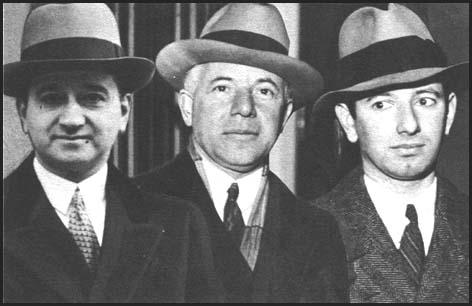Bank of the United States
The Bank of the United States was established in Philadelphia in 1791. By the 20th century the bank was one of the most important in the country. In 1930 rumours began to circulate that the bank was in trouble. On the 7th December long queues began forming outside the bank's branches. Over the next four days depositors took out $20 million from the bank. On the 11th December, all its branches closed, as the bank no longer had any money to give back to its customers. It was the most disastrous failure in the banking history of the United States. Investigators discovered that the bank's owners had been guilty of incompetence and three of them, B. K. Marcus, Saul Singer and Herbert Singer, were sentenced to terms in Sing Sing Prison.

The governor of New York, Franklin D. Roosevelt, was one of those deeply shocked by the failure of the Bank of the United States. When he became president in 1933 he persuaded Congress to pass the 1933 Banking Act. The Federal Reserve Board was given tighter control of the investment practices of banks and the Federal Deposit Insurance Corporation was set up to insure all deposits in banks up to $5,000.
Primary Sources
(1) David Kennedy, banker, interviewed by Studs Terkel in Hard Times (1970)
All through the Twenties, they were having about six hundred banks a year close. In 1929 and 1930 they got into thousands. Closing every day. There was one bank in New York, the Bank of the United States - in the wake of that closing, two hundred smaller banks closed because of the deposits in that bank from the others.
(2) James D. Horan, The Desperate Hours (1962)
It was one of the most disastrous failures in the banking history of the country. The collapse carried with it four affiliate corporations, involving an additional 200 million dollars. Men wept as they tried to rush past the police guards and pound on the closed doors; women screamed as they held up their bank books. Crowds refused to disperse and stayed outside the doors for days, hoping that their savings were not lost.
(3) Franklin D. Roosevelt, radio broadcast, Fireside Chat (12th March, 1933)
Some of our bankers have shown themselves either incompetent or dishonest in their handling of the people's funds. They had used money entrusted to them in speculations and unwise loans. This was, of course, not true of the vast majority of our banks, but it was true in enough of them to shock the people for a time into a sense of insecurity. It was the government's job to straighten out this situation and do it as quickly as possible. And the job is being performed. Confidence and courage are the essentials in our plan. We must have faith; you must not be stampeded by rumours. We have provided the machinery to restore our financial system; it is up to you to support and make it work. Together we cannot fail.
